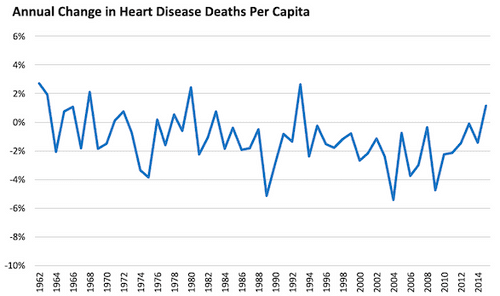Lots of Overnight Tragedies, No Overnight Miracles
Curated from: collaborativefund.com
Ideas, facts & insights covering these topics:
4 ideas
·1.66K reads
7
1
Explore the World's Best Ideas
Join today and uncover 100+ curated journeys from 50+ topics. Unlock access to our mobile app with extensive features.
The Anomaly Of Bad Events
- Bad news, like a catastrophic event, war, or death, happens quickly and instantly, and spreads like wildfire. A bad event does not take time to manifest, though the foundations have been laid long back, off the radar.
- Good things take time and happen so slowly that nobody notices that there have been gradual improvements and the problem has now declined or subsided.
67
520 reads
The Compounding Effect of News
Heart disease has declined 1.5 percent per year, and if that news is on the internet, it is not likely to go viral. But what is overlooked is the compounding effect, which is invisible in the short run, and only noticeable after 15 to 20 years.
55
449 reads
Good News: Too Slow To Notice
New technologies often take decades to become mainstream. A trickle of growth, progress or innovation does not create a ripple or spike in most people's lives.
Example: Netflix stock has grown exponentially in the last 20 odd years, but almost none of the investors have benefited entirely from it, as the progress has been too slow to be noticed.
53
347 reads
Bad News Creates A Sonic Boom
- Bad news is aggressive and attention grabbing. A pandemic took no time to put the entire world hostage. Events like Pearl Harbour and 9/11 only took a couple of hours.
- All growth is slow to rise, as it fights against many odds. A tree takes a lifetime to grow from a seed in the soil to it’s full-blown form, where it gives shade, fruit and environmental support to all.
- Setbacks are fast and furious, as they have entropy to their advantage.
56
345 reads
IDEAS CURATED BY
Damien 's ideas are part of this journey:
Learn more about problemsolving with this collection
How to use storytelling to connect with others
The psychology behind storytelling
How to craft compelling stories
Related collections
Similar ideas
4 ideas
2 ideas
The Biggest Reason Why the Okinawan Diet Works
heated.medium.com
Read & Learn
20x Faster
without
deepstash
with
deepstash
with
deepstash
Personalized microlearning
—
100+ Learning Journeys
—
Access to 200,000+ ideas
—
Access to the mobile app
—
Unlimited idea saving
—
—
Unlimited history
—
—
Unlimited listening to ideas
—
—
Downloading & offline access
—
—
Supercharge your mind with one idea per day
Enter your email and spend 1 minute every day to learn something new.
I agree to receive email updates

